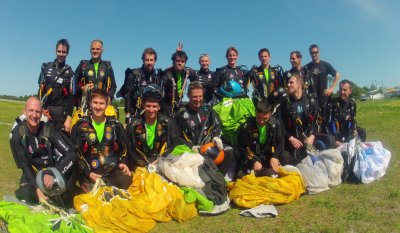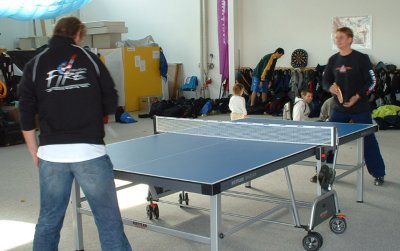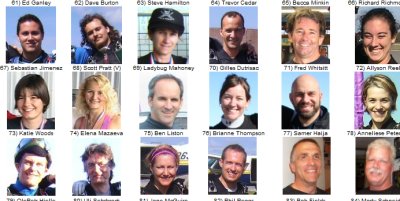
National
Skydiving
League
226 Pecan Street
Deland FL 32724
tel: (386) 801-0804
© 2003 - 2025
All Rights Reserved


226 Pecan Street
Deland FL 32724
tel: (386) 801-0804
© 2003 - 2025
All Rights Reserved


The March 2012 edition includes an article that covers an urgent topic at this time of the year. New teams are in the recruiting process or have been formed and get ready to launch the 2012 season.
It is not only important to find a good lineup with good dynamics. It is just as important to know how to keep the team together and how to keep everybody happy and in good spirits. Two of the best examples of great team glue just competed at the Paraclete XP Outdoor Championship 2012. The article explains more about it.

Many marriages have already happened by now, as new dating often begins as soon as the relationship with the previous partner comes to an end. Team forming often begins when the last competition ofthe previous season is over. Wind tunnels allow the new partners to feel each other out earlier these days, even in the winter. However, the real married life begins when you begin to hang out with each other all day at the DZ - through good and bad, through rain and shine...
Group dynamics really work the same way they do in a relationship when you jump with a team. Hopefully you have a good one, so the team honeymoon lasts forever. It may if you know what to expect and how to deal with it. Imagine: Three of the best 4-way competitors on the planet, including a pair of real brothers (NMP-PCH Hayabusa's Andy and David Grauwels, together with Roy Janssen), have been 4-way married in Belgium for seven years now, and there is no divorce in sight. The French brothers Mathieu and Guillaume Bernier, reigning 4-way world champions, have been together on the same team with Julien Degen for an even longer time. How do they all keep their relationships functional and in harmony for such along time? It seems so difficult to stick together for longer than a year - whether it is a marriage or a 4-way team. Well, let's go through it, from dating to separating.

Sit down for another meeting at the end of the day and talk more specifically about goals, desires, availability, and finances. If it all sounds good, let everybody go home and think more about it. Before the next meeting, develop a schedule, including training camps and competitions. Create a budget. Then set up the date for the next meeting. Invite a coach or an experienced competitor to this meeting to get advice on the questions you cannot answer. Same deal: Meet the team in a nice environment, skydive or fly a little bit for the fun, and talk a lot again. Present the overview of the plan to everybody.
At this meeting, you may be ready to ask for commitments. But leave it open. If somebody needs a home session again to think it over, let it happen. Set a deadline for the final decision at the end of this meeting. Make sure that you do have a coach for the first training session. I have heard teams saying too many times that they do not need a coach in the beginning. They will need one only later when they do the technical part, they say. That is very wrong. The coach is most important at the very beginning, more than at any other time. He or she will teach the team basics about procedures, team development, and basic skills. This will put your team in the position to be more self-sufficient later on and guarantee progression, which you need badly at the beginning to keep everybody highly motivated.

Make sure the group can be relaxed and have fun together. Team members need to get along with each other and respect each other. Number of jumps does not mean very much either. It does not hurt if somebody has been around for a while, but it does not mean that he/she is the best choice. And many jumps may also mean many bad habits. But bad habits can also be broken with theright attitude.
Be open to everybody. People change their minds and attitudes. Just find out how well a candidate is dealing with the group dynamics and learning skills.

It doesn't have to be like that. Even the top teams are having a lot of fun these days. It's all up to the team to make it fun or too serious. And it does not mean at the same time that it has to be hard-core competitive with that huge financial commitment. Let's understand the word "team" as a group of committed people with the same goals and attitude. The goals will be defined by the team members on their own behalf. It's up to the team to commit to one season or for three years, to 100 training jumps per year or 800.

With the right coaching and the right attitude and the necessary persistence, success is guaranteed. Success means progression. Progression means motivation. Motivation means more commitment.
But even without progression, a team may just continue if the feeling is right. Good vibes keep it fun even if the team seems to stagnate. The team may just continue due to the fact that everybody is having fun. However, there will be situations where team members will have to make a conscious effort to control the situation. It may take a step back in a discussion, an apology for an emotional reaction, a confrontation in a critical situation.
That's all part of normal human behavior, and needs to be learned and applied in normal life anyway. Do not get disappointed or frustrated if this is happening to your team. It's a part of the progression. It just needs to be fixed. Things will even be better after an argument since you learned how to deal with it and get over it. Keep the communication within the team up and going all the time. The end of each training camp is the best opportunity to talk about everything. Make sure that everybody is leaving the camp in agreement.
It's spring time - let's get 4way married...